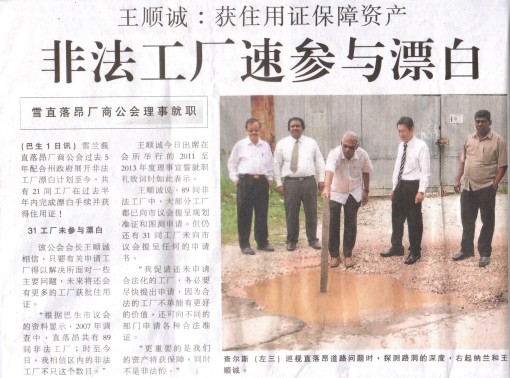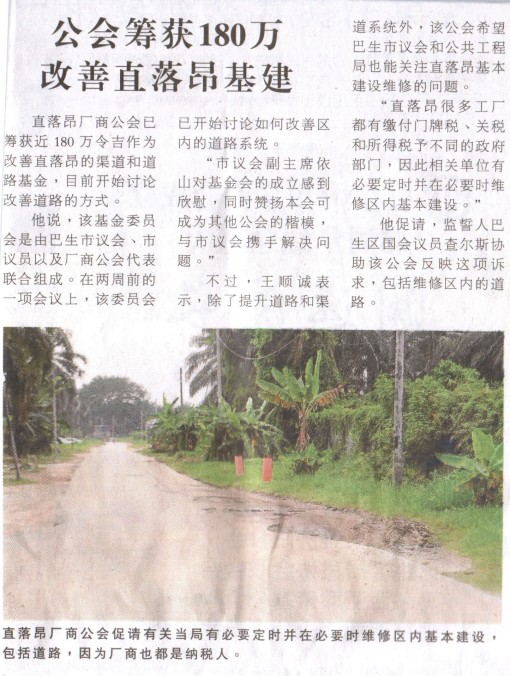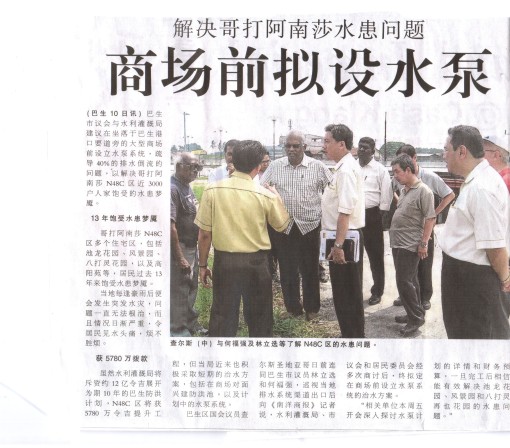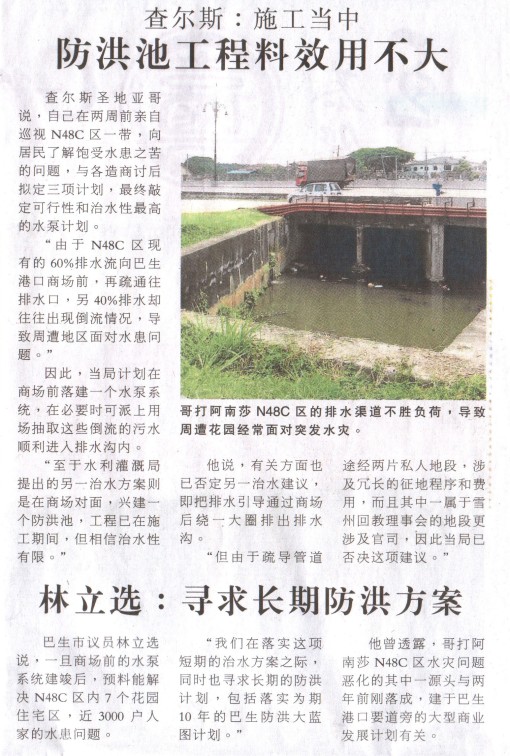Charles Santiago |
- MTUC, MEF say no to new minimum wage Bill
- Malaysian Prime Minister Defends Muzzling of Protests
- The Telok Gong Manufacturers Association (PPPTG) 6th Swearing in ceremony.
- ” Members source RM1.8 Mil for upgrading works”
- Ahli Parlimen Klang,YB Charles Santiago telah mengadakan satu sesi media bersama Ahli Majlis Perbandaran Klang mengenai masalah dan status banjir di sekitar zon N48C.
- Ahli Parlimen Klang,YB Charles Santiago telah mengadakan satu sesi media bersama Ahli Majlis Perbandaran Klang mengenai masalah dan status banjir di sekitar zon N48C.
| MTUC, MEF say no to new minimum wage Bill Posted: 14 Jul 2011 09:39 PM PDT Source: The Malaysian Insider
By G. Manimaran Bahasa Malaysia Editor July 15, 2011
Putrajaya has come under fire as Pakatan Rakyat (PR) MPs have charged that the National Wages Consultative Council (NWCC) Bill was a futile exercise as the government would still have the final say in setting a minimum wage rate. Despite widespread concerns, the Najib administration went ahead and tabled the highly-anticipated Bill in Parliament last month, paving the way for the implementation of a minimum wage policy in the country. Both the Malaysian Trades Union Congress (MTUC) and the Malaysian Employers' Federation (MEF) listed several reasons as to why they were unhappy with the Bill, with MEF executive director Shamsuddin Bardan remarking that this was the first time both groups reached an understanding regarding minimum wage enactment.
The MTUC and MEF are also opposed to the membership figures in the NWCC, saying employers and employees were seen to be the "minority groups" in the council's decision-making. Of the 29 members in the council, employer and employee groups can each send five representatives who do not have to be from the MTUC or MEF. The MTUC said it disagreed with the launching date of the minimum wage which will be executed according to different sectors, cities and jobs. It wants a national minimum wage Act to be implemented simultaneously throughout the country. "The law has just been passed but has not received the blessings of the Yang di-Pertuan Agong… so we feel that there is time for the government to rectify the unfair enactments," Shamsuddin told The Malaysian Insider. He said however that the MEF had no power to reject the new Bill. "But we want the government to amend this Bill," he added, stressing that the MEF and MTUC were never formally invited when the Bill was first drafted. "Any laws pertaining to workers and touching on the interests of employers should have been discussed via the National Labour Advisory Council (NLAC) but this has not been done," Shamsuddin said. MTUC secretary-general Abdul Halim Mansor concurred, saying that the NLAC has not had any meetings since May last year. "We have decided not to agree with a big part of the Bill… it gives too big a power to the minister and belittles the role of the MTUC when it comes to negotiations," Halim told The Malaysian Insider. The Malaysian Insider understands that many MTUC leaders were shocked when the government tabled the Bill in Parliament. "We were never consulted over the matter… that is why we are shocked, it feels as though we do not matter. "We are not saying we reject (the Bill), but we are just dissatisfied," Halim said. He said that both the MTUC and MEF had sent letters to Prime Minister Datuk Seri Najib Razak calling for a review of the law shortly after it was tabled and passed in Parliament. According to the Bill, the NWCC's role will be to advise the government on all matters related to minimum wages, including its development at the international level as well as recommendations to the government on minimum wage rates and coverage according to sectors, types of employment and regional areas, among others. It will comprise a chairman, a deputy, a secretary, at least five members drawn from public officers, at least five employee representatives, five employer representatives and another five others who have yet to be named — all of whom will be appointed by the minister. |
| Malaysian Prime Minister Defends Muzzling of Protests Posted: 14 Jul 2011 09:16 PM PDT By MATTHEW SALTMARSH AND LIZ GOOCH (NYT)Published: July 14, 2011LONDON — If the Malaysian government allowed street demonstrations of the kind seen in Kuala Lumpur last weekend, the country would face protracted instability, Prime Minister Najib Razak said Wednesday. Mr. Najib spoke after thousands of advocates of electoral change defied a government ban and held a large street protest Saturday, during which the police fired tear gas and water cannons and arrested nearly 1,700 demonstrators. "Public order is very important in Malaysia because if we allow for street demonstrations, there's no end to it, there will be another group that wants to demonstrate," Mr. Najib told a small group of international reporters Wednesday in London, where he was to meet the British prime minister and attend an investment conference. If protests are not controlled, "you will get a situation in which more and more of these street demonstrations will take place in Malaysia," he said. On Thursday in Kuala Lumpur, the Human Rights Commission of Malaysia announced that it planned to hold an inquiry into police conduct during the rally. The police response has been condemned by rights advocates in Malaysia and abroad, including the U.N. High Commissioner for Human Rights. Muhammad Sha'ani Abdullah, a member of the Malaysian commission, said Thursday that it decided to act after receiving complaints from the public, protest organizers and rights groups. "We are also acting on media reports and our own observations during the rally," he said. He said that details of the inquiry would be determined by Tuesday. In London, Mr. Najib defended the police, saying they had used "minimum force, and there was no physical contact at all with the demonstrators." The scale of the protest, he added, was exaggerated, and "a maximum of 15,000" people turned up. The police put the number at 5,000 to 6,000, while protest organizers contended it was 50,000. The government had barred the protesters from gathering in Kuala Lumpur but said they could hold a rally outside the capital. The protest leaders insisted that it be held at Merdeka Stadium in the city, however. "I was saddened by the fact that they didn't accept the government's offer," Mr. Najib said. "They still insisted on marching through the streets, because I think they wanted to get maximum publicity and secondly challenge authority in the hope that they can make this an issue." The protest movement, led by the Coalition for Clean and Fair Elections, or Bersih, sees the situation differently. An amalgam of civic groups advocating changes in electoral laws, Bersih was declared illegal on July 1, after which hundreds of activists were arrested, though most have since been released. All those arrested on Saturday were released later that night. The Malaysian Bar Council said in a report Tuesday that its monitors witnessed the police using tear gas and water cannons "arbitrarily, indiscriminately and excessively" and "beating, hitting and kicking the rally participants." The protesters, it said, acted in "peaceful and calm manner," except for an incident in which "one or more" people threw plastic bottles at a television reporter. The Malaysian home minister, Hishammuddin Hussein, said Monday that the police force would review recordings of the incidents and that appropriate action would be taken if the police were found to have acted improperly. He also said that action would be taken against any journalists who were found to have sensationalized their reports with inaccurate information, reported The Star, a newspaper. Phil Robertson, deputy Asia director at Human Rights Watch, said Thursday: "The Malaysian authorities' crushing of Bersih's march shows that when basic liberties compete with the entrenched power of the state, the government is quick to throw respect for human rights out the window." (In a letter to the prime minister at the start of this month, human rights groups including Amnesty International, Human Rights Watch and the International Federation for Human Rights cited "serious concerns about the escalating harassment, intimidation, and crackdown by your government against the leaders and supporters of the Coalition for Clean and Fair Elections." The letter said a number of Bersih's leaders and supporters had been arbitrarily detained under sedition laws in violation of their rights to freedom of association, expression, and peaceful assembly.) The main opposition leader, Anwar Ibrahim, was hurt during the disturbances Saturday, as was one of his bodyguards and another opposition member of Parliament. Mr. Anwar described the police response as "brutal" and said the police fired tear gas canisters directly at the leaders of Bersih and the opposition. Mr. Anwar's daughter, Nurul Izzah Anwar, said "many innocent people were injured," Reuters reported, and condemned the "cruelty" of the U.M.N.O. U.M.N.O., or the United Malays National Organization, has dominated national politics since independence from Britain in 1957. In 1969, sectarian violence exploded between ethnic Chinese and Malays, which brought a bloody crackdown, the declaration of a state of emergency and the suspension of Parliament. Since then, the country has developed despite the fragile, underlying social balance among Malays, who are known as Bumiputra and have benefited from preferential economic treatment, ethnic Indians and Chinese. In recent years, street protests have been rare. Still, there are rising concerns both inside Malaysia and among foreign investors about the reform movement and the effect it could have on political and economic opening. Mr. Najib warned, for example, that if U.M.N.O., which boasts more than three million members, were to respond to the protests with its own rally, chaos would ensue. "What happens if we organize a three million demonstration?" he said. "Malaysia will be plunged into a lot of uncertainty, and I don't want that to happen." Mr. Najib, who came to power in 2009, is not obliged to hold an election until 2013, but there has been speculation that he may consider an earlier date to take advantage of accelerating growth. The timing of the next election could help determine whether the protest movement fizzles out or becomes something akin to the deeper reform movement seen in the Middle East this year. The election will occur "when the situation is right," Mr. Najib said, refusing to be pinned down on timing. "You'll just have to look at the crystal ball." He did, however, promise to address some of the protesters' concerns, for example to "clean up the electoral list" to avoid voting fraud by making sure there is a biometric record of all voters. He also said that he would seek to "clarify" the system through which the armed forces and police cast ballots, another contentious issue. He said it was "up to the Election Commission to decide" whether to establish rules on extending the period for political campaigning. The government, he said, is committed to "clean and fair" elections. After London, Mr. Najib plans to travel to Rome for a meeting with Pope Benedict XVI |
| The Telok Gong Manufacturers Association (PPPTG) 6th Swearing in ceremony. Posted: 14 Jul 2011 04:11 AM PDT |
| ” Members source RM1.8 Mil for upgrading works” Posted: 14 Jul 2011 04:01 AM PDT |
| Posted: 14 Jul 2011 03:52 AM PDT |
| Posted: 14 Jul 2011 03:40 AM PDT |
| You are subscribed to email updates from Charles Santiago To stop receiving these emails, you may unsubscribe now. | Email delivery powered by Google |
| Google Inc., 20 West Kinzie, Chicago IL USA 60610 | |

 KUALA LUMPUR, July 15 — The country's largest workers' and employers' groups are in rare unity against the recently passed minimum wage law due to its wide powers and demand a review before its year-end implementation date.
KUALA LUMPUR, July 15 — The country's largest workers' and employers' groups are in rare unity against the recently passed minimum wage law due to its wide powers and demand a review before its year-end implementation date.



Tiada ulasan:
Catat Ulasan